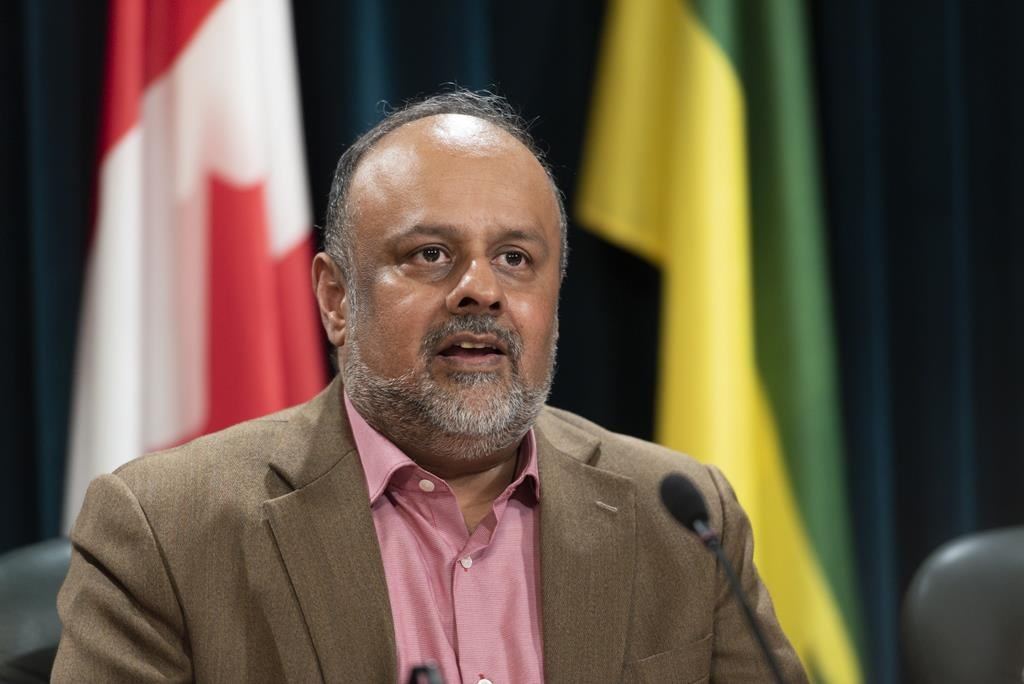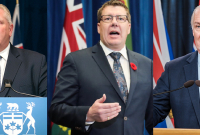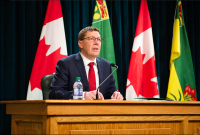Meili cries foul as pandemic resurges in Saskatchewan

Saskatchewan NDP Leader Ryan Meili slammed the government’s pandemic plan Monday saying the provincial health authority is withholding the location of those testing positive for COVID-19.
Meili accused the Saskatchewan Health Authority (SHA) and the Ministry of Health of not being clear about where the cases are in the province when releasing information on new COVID-19 numbers. The criticism comes as Montreal Lake Cree Nation faces its first case of coronavirus.
“When it’s marginalized communities, they say more about it versus mainstream communities,” Meili said. He said it could be politically motivated as provincial elections are slated for October.

The health ministry said there are reasons why it cannot name specific communities or reveal more detailed information when COVID-19 cases are identified.
“In communities with low case counts and low populations, revealing the exact location … could identify the person or patient with COVID-19. In other cases, public health may also need to investigate where the case originated,” ministry spokesperson Kaitlyn Abel told Canada’s National Observer.
"In situations where there is an outbreak or where many COVID-19 cases are identified, more exact community information can be shared as this will not identify individuals,” Abel said.
Following debates in the legislature Premier Scott Moe said Tuesday that Saskatchewan will restart daily public case updates on weekends.

"This past weekend we did have some higher case numbers and it did create some concern, and for that reason, and because we want to be as forthcoming with information as possible … we will be going back to daily reporting of case numbers," he said.
Moe said daily reporting had recently adopted a Monday to Friday schedule because cases were stable and to take some pressure off health staff on the weekends.
In April, Saqib Shahab, Saskatchewan's chief medical health officer, said that as long as an infected individual is following health authority guidelines and all their contacts have been traced where they are isn’t important.
A case of coronavirus had been assigned to the northern village of Pinehouse based on a P.O. box address when the individual was in Saskatoon. Mayor Mike Natomagan called it “very important” for people to be aware of the actual location so that the community could know how to respond.
“Knowing where that individual is, or which community, is of absolutely no value because all the contacts are accounted for and followed up,” Shahab said.

On Wednesday the health ministry said that since March it has been regularly updating Saskatchewan residents on COVID-19 and has tried to be as transparent as possible to ensure people are aware of cases across the province.
Meili called on the Saskatchewan government to share location data with stakeholder communities in the province as soon as it becomes available.
“Lots of people have changed their behaviour significantly and it's going to be hard to change it back. Not sharing the full information makes it harder for people to make those decisions wisely,” Meili said.
The health ministry said it remains committed to improving reporting to balance privacy and transparency.
“We understand the public’s desire to have exact case location information shared publicly. However, the Ministry of Health cannot risk identifying individuals or compromising a patient’s privacy,” Abel said.

Meili told Canada’s National Observer that the government’s approach to handling the pandemic isn’t working because it is mostly focused on reopening.
“We’ve got a government that thinks they’re done. They think they’ve fixed this and got it, and they don’t realize they have to stay through until the end of the job,” Meili said.
The health ministry said there is a risk of coming into contact with COVID-19 anywhere in the province.
“It is important that all residents behave and act as if it is in their community. By taking proper precautions and doing all we can to keep ourselves and others safe, we will be able to reduce COVID-19 transmission in Saskatchewan,” Abel said.
Of the 881 cases recorded in the province, 339 were in the far north, 200 in the Saskatoon area, 120 in the north, 85 from the Regina area, 84 from the south and 53 from the central region. Seventy-five are considered active.
On Friday, Montreal Lake Cree Nation, between Prince Albert and La Ronge, declared two weeks of total lockdown after announcing its first COVID-19 case.
Chief Frank Roberts and nurse manager Amanda Nelson confirmed the test results in a statement Friday.
"We'll be going into a total lockdown of our community. That's our orders," Roberts said. "People are free to go to their traplines if they want to self-isolate there.”
Nelson reminded residents to wear masks and use hand sanitizer when out in public and to follow health authority guidelines.
"Do not come to the clinic. Do not come to the store… You might not think it's COVID-related if you are sick, however, please call 811 anyway," Nelson said.
“Hopefully, we can nip this in the bud and our community will come out of this healthy and stronger.”
The Northern Inter-Tribal Health Authority's (NITHA) medical health officer Dr. Nnamdi Ndubuka issued a precautionary health advisory Friday.

“COVID-19 remains a threat to our communities,” Ndubuka said, advising northern residents to be vigilant to prevent the spread of the virus as more cases are reported across the province.
“As the province continues to reopen, we are encouraging all northern residents to practise public health measures.”
Meili said one case in Montreal Lake could lead to more if it’s not contained.
“This virus can spread very quickly. We know that one case is what led to hundreds in the northwest,” Meili said.
“Locking down the community is probably wise, given the risk for remote communities.”
Premier Moe applauded northern communities such as La Loche for dealing with an outbreak in the far north where active cases were down to six on Tuesday. The northern village of La Loche announced that there are no active cases of COVID-19 in the community on Wednesday.
Moe said that after four months of living with the pandemic, the province has dealt effectively with outbreaks, having limited cases, hospitalizations and deaths.

"We continue to see local outbreaks that show just how quickly this virus can spread if we let our guard down... The risk has not gone away," Moe said. “We have also shown that we can get these outbreaks under control, if we do the right things.”
Montreal Lake is in the northeast part of Saskatchewan which reopened earlier than the northwest due to a lower case count.
Meili said that social distancing is difficult in communities such as Montreal Lake or La Loche and "they should be getting special support and special advice.”
To date, 76,694 COVID‐19 tests have been performed in Saskatchewan. As of Monday, Saskatchewan’s per capita rate was 56,330 people tested per million population. The national rate was 87,857 people tested per million population.
“Increasing numbers over the recent number of days has been quite concerning and should serve as a reminder for each and every one of us that we have to continue with all of the good practices that have worked for us and have been successful thus far,” Moe said.
Moe said that success with containing the pandemic in Saskatchewan “in no way should change our behaviour from day to day. We have to keep doing the right things each and every day.”
Moe said to maintain physical distance, wash hands, control the number of people that you come into close contact with and to stay home if feeling unwell.
The Northern Inter-Tribal Health Authority precautionary health advisory for northern Saskatchewan is available in the Cree language and in the Dene language.
Michael Bramadat-Willcock/Local Journalism Initiative/Canada's National Observer











Comments
Nobody was upset about Typhoid Mary being identified. Covid-19 is not one of the medical conditions that should be kept private.
I dunno. If I had it, I wouldn't want to be "outed" while so many are screaming about their "rights" (to do whatever they please, how they please and where they please, regardless of whom they might harm). It wouldn't be a far stretch to imagine suchlike blaming the sick person for "ruining it for the rest of us," notwithstanding that the sick person got that way because *someone* didn't mask and distance.
We've been able in Ontario to say there were x number of cases in a particular area, without naming towns or cities.
Toronto has produced a map of neighbourhoods, noting the total case count in each. Personally, I'd like to know the *active* (and perhaps suspected) case count over, say, ongoing 2-week periods.
I fail to see how that has any potential to run afoul of privacy considerations. I mean, if there's one case, and you were it, that'd be definitive to you, but not anyone else.
I think ppl would be less tolerant of groups of (particularly young) folk ignoring the safety rules, if they could connect that behaviour to growing virus activity.
Probably plenty of "Our Precious Seniors" who've now been in protective self-isolation in Toronto for 4 months, and who don't have close family nearby to "pod" with, are rapidly losing any semblance of patience they had, as they cope (seniors are as a cohort far more likely to be poor than working-age people) without AC, without being able to, say, go out for an ice cream ...
Frankly, now that everyone needs a mask to enter public indoor spaces, the common areas including elevators should be subject to the same rules, and management should be required to do a decent job of "deep cleaning" at least daily.
If everyone follows social distancing...wears masks...washes hands...that is all they can control. Hot spots deserve more PPE and more healthcare funding....but privacy is of most importance.